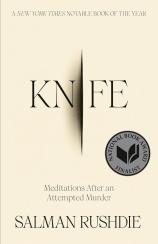Knife: Meditations After an Attempted Murder
Review
Knife: Meditations After an Attempted Murder
Who you are, what you’ve done, who you’ve influenced, who you’ve angered --- these all matter tremendously in the relentlessly exposed world of celebrity figures.
No one understands that exposure better than Indian-British-American author Salman Rushdie, known to many only for the fatwa pronounced against him on February 14, 1989, by the late Islamic extremist leader Ayatollah Khomeini. Khomeini disliked THE SATANIC VERSES so much (despite no evidence that he actually ever read the book), he decided that the entire Muslim world should be ordered to kill its author on sight.
But what matters immediately after someone tries to kill you? What really happens along the journey of surviving against near-impossible medical odds? This is what KNIFE, Rushdie’s latest and most eloquent memoir, is really all about.
From blurred recollections of the horrific minutes following a knife-wielding assailant’s onstage attack at the prestigious but security-deficient Chautauqua Institution on August 12, 2022, to the physically and spiritually altered person who typed the last period in the last sentence of KNIFE barely 18 months later, Rushdie tells a story that can only be described as deeply, totally and fundamentally human.
"KNIFE is a must-read, even if you’ve never read anything by Salman Rushdie. It’s a must-read even if you hate Salman Rushdie. And, above all, it’s a must-read for anyone brave enough to ask, 'Who the heck is Salman Rushdie?'"
Even more powerfully than his would-be assassin’s knife literally slicing through tissue, nerves and bone, Rushdie’s KNIFE slices metaphorically and philosophically through thick layers of privilege, culture, history, entitlement, gender, status, even inherent talent, to wrestle with the vulnerability that is in all of us, and lives surprisingly close to the surface of who we are as a social species.
In this violent century, we don’t need the fame and notoriety of a fatwa performed by a misguided and radicalized recluse to be caught as tragically unprepared as Rushdie was, as public victims lying on the floor in our own blood.
During 2023, two mass shootings per day occurred in the US --- so many they barely made headlines outside the states in which they happened. In Canada, there were only half-a-dozen in the same year, but no less horrific in their public impact. They were followed by Canadian national media for days, weeks or even longer, with most reports adopting Rushdie’s wisdom in not repeating the names of the alleged or convicted perpetrators. He rightly implies that terrorism of all kinds thrives on copycat notoriety and the posthumous elevation of named assassins to martyrdom. That he would not give his attacker.
Nevertheless, the self-made identity and imagined character of his failed murderer inspired Rushdie to delve deeply, and painfully, into what motivates one human to kill another --- a total stranger known to him only through the distortions of extremist indoctrination.
Throughout what may prove to be the most controversial chapter of KNIFE, Rushdie creates a series of hypothetical interviews with “A,” based on similar interrogations of incarcerated terrorists found in public records. At the time the book was released, he had not faced his assailant in court and has yet to do so; one can read this section as a vicarious but deeply discerned “victim impact statement.”
While the literary energy spent on Rushdie’s elusive assassin, a devout follower of the ubiquitous “Imam Yutubi,” is considerable, it doesn’t detract from his humble and always perceptive reflections on the many real-life people whose combined skill and empathy made his survival and ongoing healing possible. Named and nameless alike, all richly deserve their front-page dedication in the book.
At the root of every procedure, every interaction, every tiny fragment of physical or mental progress toward an altered state of wholeness and repaired personhood, Rushdie identifies nothing less than love. That’s it --- love. Not the greeting card kind, not the casual truism kind, not even the theological kind (and Rushdie is one of the world’s most spiritually educated atheists), but a potent emotional, philosophical and visceral chemistry that recruits all the good things of which humanity is capable into overcoming and transcending our times of crisis.
Not surprisingly, Rushdie devotes some of his most engaging and poignant prose to his family, especially the support of his adult sons and new wife, the poet Rachel Eliza Griffiths. The couple had been married barely a year when the knife attack occurred.
Rendered physically and even creatively immobile for long months of recuperation, Rushdie reflects often in KNIFE how the trajectory of time became a radically changed concept for him. It wasn’t simply about having more time in which to examine his own psyche or deal with the unpredictable effects of trauma. It was, and still is, about regaining a renewed understanding of his own physical senses, once taken almost for granted, but now a source of both wonder and frustration --- learning to visually navigate the world with one remaining and imperfect eye, learning to compensate for a left hand that only half functions, learning that every movement is both a victory and a vulnerability.
And that brings the entire circle back to love. Rushdie reiterates in numerous contexts how the monumental disruption to their barely begun marriage threw up challenges that no new bride could ever anticipate. Eliza has navigated over or through every obstacle as they work to reclaim the life that true love deserves.
KNIFE is a must-read, even if you’ve never read anything by Salman Rushdie. It’s a must-read even if you hate Salman Rushdie. And, above all, it’s a must-read for anyone brave enough to ask, “Who the heck is Salman Rushdie?”
Reviewed by Pauline Finch on June 1, 2024
Knife: Meditations After an Attempted Murder
- Publication Date: April 8, 2025
- Genres: Memoir, Nonfiction
- Paperback: 224 pages
- Publisher: Random House Trade Paperbacks
- ISBN-10: 0593730259
- ISBN-13: 9780593730256




